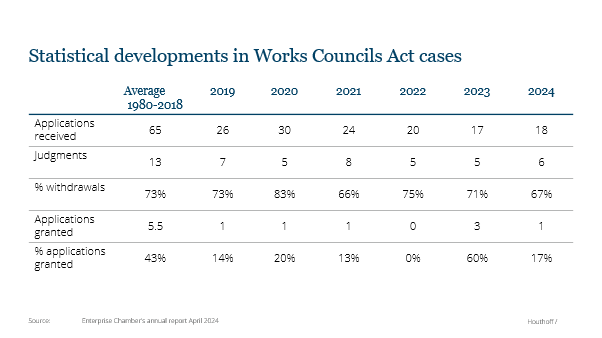Appeal proceedings before the Enterprise Chamber
Under Article 26(1) of the Works Councils Act, works councils can lodge an appeal with the Enterprise Chamber against an entrepreneur’s resolution within one month:
- if the resolution does not conform to the works council’s advice;
- if new, relevant facts become known after the advice has been given; or
- if, wrongly, no advice was requested. The appeal period starts on the day following written notification of the final resolution to the works council.
The Enterprise Chamber first fully assesses whether the duty to request advice applies and whether the procedural requirements have been met: full and timely provision of information, a properly substantiated resolution, and consultation with the works council. If this assessment reveals no essential defects, a substantive test of reasonableness is performed: could the entrepreneur have reasonably arrived at the resolution after a careful weighing of interests? The Enterprise Chamber will only intervene in the event of evident unreasonableness or serious procedural defects.
The more specific the objections made in the works council’s advice, the more weight they carry in the assessment. In principle, entrepreneurs need only consider objections that were explicitly included in the advice.
Number of new cases, applications granted and applications withdrawn

In 2024, the Enterprise Chamber received 139 new cases, most of them inquiry proceedings. In addition, 18 applications (13%) were filed under the Works Councils Act. A hearing took place in eight Works Councils Act cases and judgment was given in six cases; only one works council application was granted and five were dismissed. Accordingly, works councils’ chances of success were lower than in previous years, except for the rise seen in 2023.
The number of withdrawals is also worth mentioning: eight applications were withdrawn before the hearing and three afterwards. In practice, lodging an appeal with the Enterprise Chamber is often used as a strategic move to initiate or intensify the negotiating process. In view of the short appeal period of one month, parties sometimes file an application as a precaution. This serves as a means of exerting pressure during the negotiations. If the parties subsequently reach agreement, the application is withdrawn. The risk of reputational damage can also play a role: public proceedings can generate negative publicity, motivating companies to settle the dispute quickly and out of court.
Processing time
The processing time is the number of days between the date that the application is filed and the date on which judgment is given. This was an average of 150 days in Works Councils Act cases in 2024, which is more than in 2023 and comparable to the level of 2022. Occasionally, handling of the case is stayed (sometimes for a long period) as a result of the aforementioned settlement negotiations or a mediation process between the parties. Although these routes make sense in terms of procedural economy, they do prolong the total processing time. According to the Enterprise Chamber, a shorter period is not necessarily better. What is important is that the duration matches the complexity and urgency of the case and leaves scope for balanced litigation. The extent to which this is in fact achieved cannot be directly inferred from the data available.
Application granted
The only application granted in 2024 concerned the substantiation given for a resolution. The Royal Netherlands Academy of Arts and Sciences (KNAW) decided to phase out research using monkeys, despite negative advice from the works council. The works council took the view that no careful weighing of interests had taken place and turned to the Enterprise Chamber. The Enterprise Chamber ruled that the entrepreneur had breached Article 25(3) of the Works Councils Act by failing to provide any specific, assessable substantiation. Its resolution was based primarily on a choice of principle, without any transparent weighing of interests. Alternatives and mitigating measures had not been demonstrably explored or substantiated, and the phases and timing chosen had not been sufficiently substantiated in terms of proportionality. The Enterprise Chamber declared the resolution manifestly unreasonable and obliged the KNAW to adopt a new, properly substantiated resolution.
Key takeaways
The Enterprise Chamber’s annual report 2024 highlights the importance of careful compliance with the right of prior advice. Overall, fewer works council applications were granted: only 1 out of 18 applications filed. The Enterprise Chamber applies a strict review of procedural requirements and assesses the reasonableness of substantive objections. Withdrawals before and after a hearing indicate that proceedings are often used strategically. For entrepreneurs, this highlights the need to prevent formal disputes by giving full disclosure in time, engaging in serious consultation and substantiating resolutions properly. This will reduce the risk of disputes, long processing times and reputational damage and will increase the works council’s confidence in the decision-making process.




